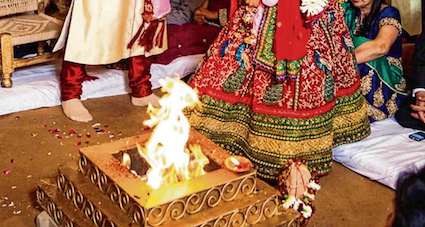The Hijab Row in Karnataka has thrown up Uniform Civil Code (UCC) again in discourse, more so since Uttarakhand’s chief minister Pushkar Singh Dhami intends to implement it if voted to power.
Meanwhile, women in burqa around the country have begun appearing on streets with placards and Organisation of Islamic Cooperation (OIC) amongst other are stoking up the heat abroad.
Uniform Civil Code for all Indians concerns only marriage, succession, inheritance and divorce. Every other law in India—criminal, commercial etc—is common.
But it would again put Hindus at a disadvantage as their personal laws were codified way back in 1956 itself.
The Nehru government codified the Hindu personal laws into four successive bills under the Hindu Code Bill.
Dr Ambedkar too supported Nehru as he had already prepared the framework much before the independence.
All of it was done without consultation with Hindu community.
Without thought that the Hindu culture is immensely diverse.
That it led to a lot of Hindu customs completely done away with.
The Hindu Civil Code was based only on two schools—Mithakshara and Dayabhaga.
The diversity of Hindu religion hardly received any consideration.
The vibrant Hindu practices in North, South, East and West were all clubbed together and codified into a personal law for Hindus.
Unlike Hindus, personal code of followers of other religions, such as Muslims and Christians, have been effectively left with their own community and religious authorities.
There is no point in pretending that Uniform Civil Code, if introduced, would be seen as a secular exercise.
It would be seen and judged through the lenses of religion-community. Period.
Unlike Hindus, religious leaders of others would be consulted. If UCC is implemented, same should happen with Hindus—their personal laws need be codified again and after consultations.
Would UCC happen without Hindus as their personal laws have already been codified?
Won’t Hindus be losing out again since they would be out of this UCC purview?
Is that one would call a “secularism” and “democracy,” equality before law?
Is it fair to see Hindus from the lenses of BJP and RSS when it has existed much before the two came into existence in the 20th century.
And what chances do you think UCC has when even the matter of Hijab in a secular classroom has been turned into a raging affair?
In 1998, when the then prime minister Atal Bihari Vajpayee wanted to usher in Uniform Civil code, the outcry was Muslims were not ready.
Now it’s 2022 and again the howl would be Muslims are not ready.
A Saudi Arabia could makes moves to suit Islam to modern needs but in India it won’t happen.
Not a single Muslim-centric law in India has been passed since 1947 which aims constitutional restricts on their religious rights.
There was one exception of Shah Bano in the 80s who was awarded the maintenance under marriage by the Supreme Court before the Rajiv Gandhi-led government made a hasty retreat and overturned the apex court.
Advocate J Sai Deepak, an activist like few, says that India has already seen two waves of colonisation, maybe three: first by Muslims, then Christians and now the Nehruvian-Marxists.”The third are hell-bent on propagating the first two colonisations and change the self-image of the country and its’ natives. That’s a fact.”
Sai Deepak also makes a pertinent point: What if Hindus patience runs out?
“Even after being patient for so many decades, when Hindus have finally said enough is enough, we are only asking for parity and not preferential treatment, and even if parity is seen as inequality and discrimination, well history has a way of teaching lessons and no constitution can come in that particular way because the constitution is part of the history and history is not the part of the constitution.”
(Post Script: Pakistan meanwhile has already codified the Hindu marriage bill. And it’s already four years to it. So much for secularism).


